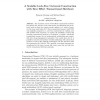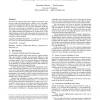45 search results - page 1 / 9 » Using data structure knowledge for efficient lock generation... |
PPOPP
2010
ACM
14 years 2 months ago
2010
ACM
To achieve high-performance on multicore systems, sharedmemory parallel languages must efficiently implement atomic operations. The commonly used and studied paradigms for atomici...
WDAG
2010
Springer
13 years 2 months ago
2010
Springer
The imminent arrival of best-effort transactional hardware has spurred new interest in the construction of nonblocking data structures, such as those that require atomic updates to...
ACMMSP
2006
ACM
13 years 10 months ago
2006
ACM
We present an implementation and evaluation of atomicity (also known as software transactions) for a dialect of Java. Our implementation is fundamentally different from prior work...
PPOPP
1997
ACM
13 years 9 months ago
1997
ACM
As shared-memory multiprocessors become the dominant commodity source of computation, parallelizing compilers must support mainstream computations that manipulate irregular, point...
PLDI
2009
ACM
13 years 11 months ago
2009
ACM
Multicore designs have emerged as the mainstream design paradigm for the microprocessor industry. Unfortunately, providing multiple cores does not directly translate into performa...


